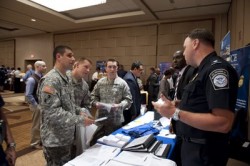 When the same peer group surrounds an individual for an extended period, movements, actions, and language of that group become second nature. Often times, this is seen in members of the United States Armed Forces.
When the same peer group surrounds an individual for an extended period, movements, actions, and language of that group become second nature. Often times, this is seen in members of the United States Armed Forces.
With this in mind, human resources professionals should understand that it is common to witness specific lingo or actions that have become second nature during their tenure in the military. And, as many members of the Armed Forces return home to a progressively competitive civilian job market, you will see more terms, MOS numbers (Military Occupational Specialty codes), and job descriptions that may catch you by surprise.
To ready yourself, read further and learn how to prepare a superior interview experience for both the veteran and yourself.
Push the Breaks
I have seen thousands of resumes in the past few years and had the pleasure of interviewing some great applicants in person, over the phone and recently by hosting Virtual Career Fairs via Google+ Hangouts. One that particularly sticks out was a Navy EOD (Explosive Ordnance Disposal) specialist who caught me by surprise with technical jargon that made no sense to me. I knew his position in the military was important, but had little idea as to what he was talking about.
Since the smile and nod trick only works with my wife, I had to stop him and ask what everything meant. I explained to him that I had no prior military experience, and requested he speak to me as if I was in elementary school. The request caught him by surprise. He chuckled, apologized for the military speak, and proceeded to give me information I could easily understand.
Military members have grown accustomed to interacting with others in their division, and sometimes that lingo will translate over to the civilian world. In cases like this, it is best to pump the brakes and just ask for clarification; if nothing else, it lightens the mood and allows them to open up.
Uncover Abilities With Performance-based Interviews
Brain Stann, a highly decorated former Marine Corps captain and president of Hire Heroes USA, said, “Most of these men and women have never applied for a job before. They went straight from high school or college and they went into the military.”
Stann is saying that veterans often have difficulty translating their skill sets effectively since the military is the only career they know. Be prepared for this. The first interview toward their new civilian career could be with you.
To understand a veteran’s qualifications, use the performance-based interview approach. This is a common interview style — actively used for the past 30 years — and focuses on what a person has done, instead of what they will do.
As many recruiters know, the performance-based model does have its flaws; an applicant with great presentation skills often receives consideration by conveying what the interviewer wants to hear over what may, or may not, be true
Verifiable Experiences and Achievements
Avoiding this isn’t difficult. Shift the focus from past behavior to verifiable experiences and achievements that matter most to the specific position. In short, do not look at commendations, medals, and awards, but the path that led them there.
This may require some tailoring of normal interview questions to fit the applicant, and a readiness to know when to shift the subject if details become graphic. A few example questions to ask, pertaining to skills, include:
- How would you describe your position in layman’s terms?
- Could you list some key activities you performed, and in what circumstances or conditions?
- What people or resources fell under your responsibility?
Above anything else, remember that interviewing a veteran is no different than interviewing a civilian candidate. The Department of Veterans Affairs even recommends using performance-based interviews for applicants directly out of the service, just like any other candidate.
The Do Not Ask List
When conducting your interviews, remember to keep all questions legal by avoiding any questions relating to the applicant’s military status, disability status, or type of discharge.
Pertaining to military status, it is unlawful to ask a National Guardsman if they are going to be deployed soon, or asking a veteran if they are considering reenlisting. That is along the lines of asking a female applicant if they are pregnant.
As for disability status, refrain from any questions that could reveal this. Directly asking a veteran if they have PTSD is not legal. As for interviewing a wounded warrior, the same laws apply. It’s perfectly fine, and I would encourage it, asking if an applicant read the job description; however, questions that would reveal a disability or traumatic brain injury directly violates the Uniformed Services Employment and Reemployment Rights Act as well as the Americans with Disabilities Act.
Lastly, avoid questions related to discharge status. While not per se illegal, this as an area to steer clear of. Asking questions that pertain to education and service experience is fine, but do not cross this line.
Veterans possess skills and qualities that employers find in their best employees, making them not charity work, but highly sought after. Qualities like loyalty, respect, leadership, teamwork, and the ability to produce results make these men and women great choices for any organization.
So as you find your next batch of new hires, remember that sometimes it takes a little extra time and creative questions to dig deeper and uncover the values and qualities that mesh with your company’s goals.